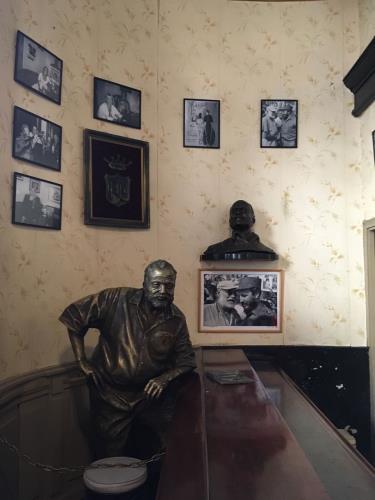Un obtained the dual Bachelor degrees in Chinese Language and Art (film and television production) of Peking University and dual Master degrees in East Asia Studies and Asia Pacific Studies of University of Toronto with the research field in literature and movies. She won the Henry Luce Foundation Chinese Poetry & Translation Fellowships and had been the village residing poet in the Vermont Creative Studio. She was invited to attend many international poem festivals such as the one held in Portugal and worked as the lyricist of Macao’s first original indoor opera A Fragrant Dream. She published some collections of poems in Cross-Strait regions, and has been engaged in academy and publication for long time and writes columns for media organisations in Taiwan, Hong Kong and Macao.

Every passenger applauded, as tradition requires, the moment we landed at Havana Jose Marti International Airport. However, as I really set foot on this land of wonders, I didn’t think of cigars or rum, the handsome Che Guevara or the strongman Fidel Castro. Instead, it came to my mind the American novelist Ernest Hemingway.
At the very start, Cuba’s political progress was inextricably linked with literature. In fact, poems were the very stimulant and catalyst for the Cuban Revolution and Cuba’s greatest hero José Martí was a poet himself. Many guerrilla fighters would carry around not only guns, but also collections of poems. Under the communist regime, the internet penetration rate is low in Cuba. However, the illiteracy rate in Cuba remained nearly zero. In fact, most Cubans have the habit of reading regularly.
Due to the half-century isolation acted by the U.S., Cuba’s cultural and creative industry didn’t have any global impact, perhaps except for Buena Vista Social Club (the club also visited Zhuhai the other years). Ironically, however, it is exactly the literary heritage and tourist resources left by American literary giant Ernest Hemingway that drew many tourists to Cuba. The Nobel laureate visited and had lived in Cuba for nearly two decades and carefully interweaved his love for Cuba and observation of Havana into his works. His novels, such as The Old Man and the Sea and Islands in the Stream, can be called the best tourist guidebooks to Cuba (the former was sold for more than 5.3 million copies within 48 hours after it was published, setting a record in the global publishing history). Hemingway’s account and literary cameo of Cuba have drawn tourists around the world to visit Cuba and re-visit the places he used to frequent, including bars such as El Floridita and La Bodeguita del Medio. Room 511 of Ambos Mundos Hotel, the very place he wrote For Whom the Bell Tolls, and the old house he used to live in in suburban Havana have already become important cultural symbols and tourist attractions to the city. Today, Hemingway International Billfishing Tournament is an annual event in Cuba. Mojito and Daiquirí (Hemingway’s favourite) and various souvenirs and publications centred around Hemingway have always been the best-selling products in Cuba for the past decades. After Cuba and the U.S. resumed diplomatic relations in 2015, the fad for Hemingway continued to surge. The biographical documentary Papa Hemingway in Cuba, therefore, was filmed as the times required. American funds donated half a million US dollars to preserve Hemingway’s old houses in Cuba, and special archives were established to conserve Hemingway’s manuscripts. Therefore, it’s appropriate to say that Hemingway has become the most popular IP and ambassador to Havana and a windfall to the city.
The reason Hemingway’s literary works are still attracting people from around the world to visit Cuba is that they are more than tourist literature. Hemingway’s account of Cuba is not at all touristy, but rather down-to-earth. To understand Havana from the aspect of ordinary Cubans and uncover the unrecognised beauty, Hemingway dived deep into the everyday life of ordinary Cubans from all walks of life and the urban fabric of the city.
Many mega-cities around the world have their own “writer in residence plans”, such as Venice, Berlin and Shanghai. In short, it is to have foreign or non-local writers live in the city for a certain period of time, participate in cultural exchanges, tap into the everyday life of the city, share observation or write stories around the city from an entirely novel aspect. Although Hemingway was not an officially invited writer to Havana, he demonstrated the great influence of a foreign or non-local writer to a city. Literary works can add to a city’s appeal and enrich a city’s cultural connotation. Writers’ footprint in a city can even help spawn an entire cultural industry chain (including publications, films and tourist attractions) in a city. While publicity slogans can never elaborate on a city’s appeal, literature can.
Although Macao has also been promoting similar plans in major universities, non-local writers were also invited to attend Macao’s non-governmental literature festivals, and writers were encouraged to write stories centred around Macao, most writers limited their footprint in the University of Macau, which situates only in Hengqin. As a result, these plans became mere formality and ended up nothing in particular.
The key to developing cultural and creative products is not only about good ideas, but also about the ability to tell stories. On the one hand, relevant parties have to discard cultural protectionism and don’t stick to the idea that “only Macao people should contribute to Macao literature”, while non-local and foreign writers should be given adequate opportunities to get to know Macao and willingly write stories about Macao. On the other hand, the stereotype towards “writer in residence plans” and “research trip” should be dispelled, so that more Macao writers could visit other countries, engage in short-term exchanges, build up their global reputation and network. As a result, they will be able to look back on Macao from a more unique and original aspect. Only then can literature become future-proof publicity and promotion, and a distinctive Macao can be created by literature.